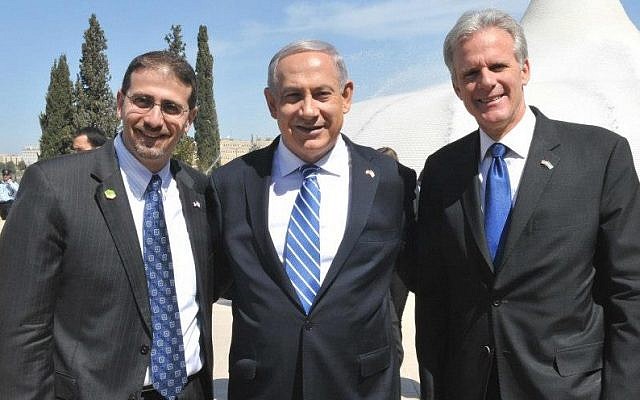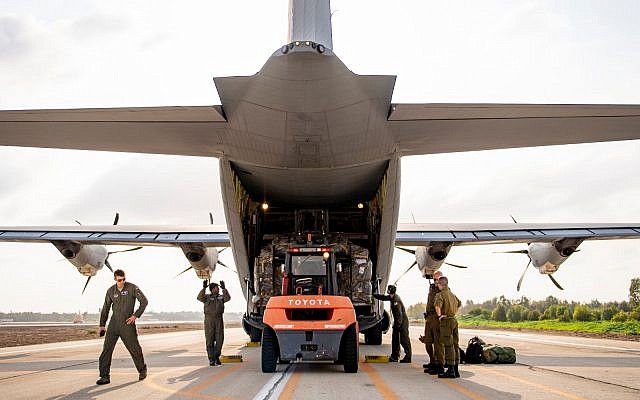Netanyahu claims the pact he vows to advance after the election will guarantee Israel’s security ‘for generations.’ But successive Israeli governments have always rejected the idea

The final pre-election promise of Prime Minister Benjamin Netanyahu’s diplomatic blitz, which included vows to annex the West Bank settlements and wage a decisive war against Hamas, was to start negotiating a US-Israel defense treaty.
Many observers viewed Netanyahu’s pledge as just another way to flaunt his close personal ties with US President Donald Trump, and dismissed the idea of a mutual defense pact as old, unrealistic, and — worst of all — detrimental to Israeli security interests.
Given the already robust US-Israel defense cooperation, formalizing it in a mutual defense treaty would bring little to no additional benefit, say many experts, including former top diplomats and defense officials. Instead, they warn, it may hamper Israel’s freedom to act militarily and would likely include an obligation to send troops on overseas missions to fight America’s wars.
“This is a serious issue deserving deep discussion, and not a quick shot from the hip on the eve of an election, with the Israeli public unaware of its profound implications,” said Amos Yadlin, a former head of Israeli military intelligence.
Like with Netanyahu’s other major policy announcements, which were made hastily and deliberately kept vague, the devil’s in the details. Whether a “Mutual Defense Treaty,” as Trump termed the ostensible future deal in a tweet Saturday, would be good for the Jewish state depends, of course, on the fine print.
I had a call today with Prime Minister Netanyahu to discuss the possibility of moving forward with a Mutual Defense Treaty, between the United States and Israel, that would further anchor the tremendous alliance….
— Donald J. Trump (@realDonaldTrump) Setyembre 14, 2019
In the days before the elections, Netanyahu appeared more interested in stressing the “historic” achievement to get the US president to publicly commit to discussing such a move than in discussing its implications in any depth.
“This is historic because it adds a powerful component of deterrence against our enemies, alongside maintaining the ability to act, and freedom of action, of our forces,” he declared on Sunday. “On this we will always insist and it will always be in this defensive agreement just as it has entered into the other defensive agreements. This is a main component for coming generations to ensure our future.”
Netanyahu was trying to defang the main point critics make when denouncing the idea of a defense alliance — that it potentially ties the hand of Israel’s military.
It’s not clear that such a pact would give the US the ability to veto Israeli operations, but if it does, it could have potentially dramatic implications.
If Washington and Jerusalem had agreed to such a pact prior to June 1981, Israel would not have destroyed Iraq’s nuclear reactor, Netanyahu’s former defense minister (and current political rival) Moshe Ya’alon argued Sunday in a radio interview. “Because the Americans were against it. President [George] Bush was against it. And therefore it wouldn’t have happened.”
Today, Israel may lose its ability to attack Iranian-linked targets in Syria, Lebanon or Iraq, he warned. “If we’re in a defense alliance, the Americans have a right to veto.”
In August, after alleged Israeli airstrikes on Iranian targets in Iraq, the Pentagon released a statement in support of Iraqi sovereignty that reiterated America’s opposition to “any potential actions by external actors inciting violence in Iraq.”
“When you’re formal treaty allies, there’s a greater presumption of agreement and support for the military actions of your ally,” said Dan Shapiro, a former US ambassador Israel and today a visiting fellow at Tel Aviv University’s Institute for National Security Studies, who was skeptical about the need for a formal defense pact.
Israel’s alleged strikes in Iraq, “which is obviously a very sensitive area for America,” are one good example showing that sometimes US interests diverge from Israeli interests, he said.
Any proposed US-Israeli defense alliance should be judged “on its merits,” he tweeted on Sunday, noting the conspicuous timing of Trump’s tweet, less than a week before Israel’s Knesset elections.
A US-Israel defense pact should be debated on its merits. Leading US & Isr strategists have repeatedly found it unnecessary &unhelpful. Maybe its worth a re-look. But anyone who favors it should be appalled by Trump’s cheap politicization of the idea in a lame pre-election tweet.
— Dan Shapiro (@DanielBShapiro) Setyembre 15, 2019
Netanyahu, in several interviews this week, rejected the claim that a mutual defense pact would tie Israel’s hands. France and Britain are members of NATO, a Western defense pact, and both countries have over the years launched attacks on countries without first getting a green light from others in the alliance, he argued.
Netanyahu did not address the other drawbacks of a mutual defense alliance, chiefly the fact that the word “mutual” implies that as much as the US commits to defending Israel, Israel would be obligated to come to America’s defense, which may include sending troops to fight America’s wars abroad.
“The Golani brigade in Afghanistan? No, thanks,” Yadlin said.
“A defense treaty with the US would strengthen Israel’s deterrence, but its costs will outweigh its benefits,” he opined.
In a series of tweets, Yadlin, who today heads the INSS, outlined several other reasons Israeli governments have in the past refrained from signing defense pacts with Washington.
One of them is the “fundamental principle of Israel’s defense” — to take pride in the Jewish state’s ability and desire to protect itself, by itself. “We should not risk American soldiers in our defense!” Yadlin wrote.
Furthermore, he noted, defense treaties entail a commitment to protect each other’s borders. “Does the prime minister intend to discuss our borders with the US Senate now?” Yadlin asked rhetorically.
His point touches on two important things to remember when discussing a defense pact. For one, signing formal treaties with other countries is not the prerogative of the US president, but of Congress, and it is unclear whether Trump would be able to obtain the required majorities for a document that includes terms satisfying Israel’s requirements.

Secondly, most American politicians, including Israel’s staunchest allies in Congress — for example, Senator Lindsay Graham, who continued on Sunday to champion the proposed defense pact — are in favor of a two-state solution. A treaty about defending each other’s borders would likely have to determine where Israel would draw its borders in Jerusalem and the West Bank.
Israeli orange juice instead of Israeli troops
The idea of a Israeli-American defense pact is almost as old as the State of Israel itself, said Michael Oren, a former Israeli ambassador in Washington. Before his stints as diplomat and later as politician, Oren wrote highly acclaimed books about the history of America’s involvement in the Middle East.
“People like Abba Eban and Moshe Sharett were in favor, but David Ben-Gurion was ambivalent about it, because such a defense treaty could tie our hands. Nobody knows what strings are attached,” Oren said in a recent interview. “In 1950, the question was whether Israel would have to send soldiers to help the Americans in the Korean War.”
Ben-Gurion eventually decided to donate Israeli-made orange juice to US troops in Korea, according to Oren.
Netanyahu himself repeatedly rejected offers of a US-Israeli defense treaty. During his first term as prime minister, in the late 1990s, then-US president Bill Clinton brought it up twice, but Netanyahu rebuffed the idea.
A decade later, Netanyahu was very upset when then-US secretary of state Hillary Clinton approached him with a similar proposal, Oren said.
“I recall how, back in July 2009, Hillary Clinton suggested the US could extend its nuclear umbrella over Israel and Bibi strongly objected,” Oren said, using the prime minister’s nickname. “It created the impression that Israel could not defend itself by itself — a dangerous message to our enemies — and that the US might ultimately reconcile itself to a nuclear Iran.”

Oren, who until earlier this year served in Netanyahu’s government as deputy minister, said he never liked the idea of a US-Israel defense pact.
“Zionism means that we came back to this country in order to be able to defend ourselves against our enemies. Why are we outsourcing our survival?” he asked.
The status quo gives Israel all the advantages of a strong US-Israel partnership, without any of the potential disadvantages, he posited.
“The US-Israel defense alliance, though not formal, is the deepest defense alliance the US has had with any foreign power in its postwar history. The US develops multilayered anti-missile systems with us. It shares intelligence at the highest level. It has joint training and maneuvers with us. Every American fighter pilot wears an Israeli helmet. American naval destroyers carry an Israeli gun,” Oren said.
“And I think it’s safe to say — [former US president Barack] Obama used to say this all the time — that if Israel ever got into a serious conflict, the US is going to be there. We can rely on the United States. It has resupplied us with ammunition in every single vital conflict we’ve had.”
However, entering a mutual defense treaty could get problematic for Israel on various levels, Oren said. For instance, what would Israel do if the US were to ever enter a military conflict with Russia?

Danny Ayalon, who served as Israel’s ambassador in Washington between 2002 and 2007, during his term tried to advance a mutual defense treaty with the US, but soon found that “it was a nonstarter” for the administration of George W. Bush. “They would not even start discussing it,” he recalled.
In that respect, “the very fact that an American president is willing to discuss it now is a major achievement for Israel,” Ayalon, a former deputy foreign minister for the hawkish Yisrael Beytenu party, told The Times of Israel on Sunday.
But whether the agreement Trump and Netanyahu vowed to discuss later this month, on the sidelines of the UN General Assembly, is good or bad for Israel depends on what it entails, Ayalon stressed. In a defense treaty that is mutual, as Trump indicated, the disadvantages outweigh the advantages, he said.
“However, if we can get a treaty that is not reciprocal, in which Israel does not lose its freedom of operation and does not have to participate in American missions overseas, that would change the equation,” Ayalon said.
“But of course that would be too good to be true.”
As reported by The Times of Israel
